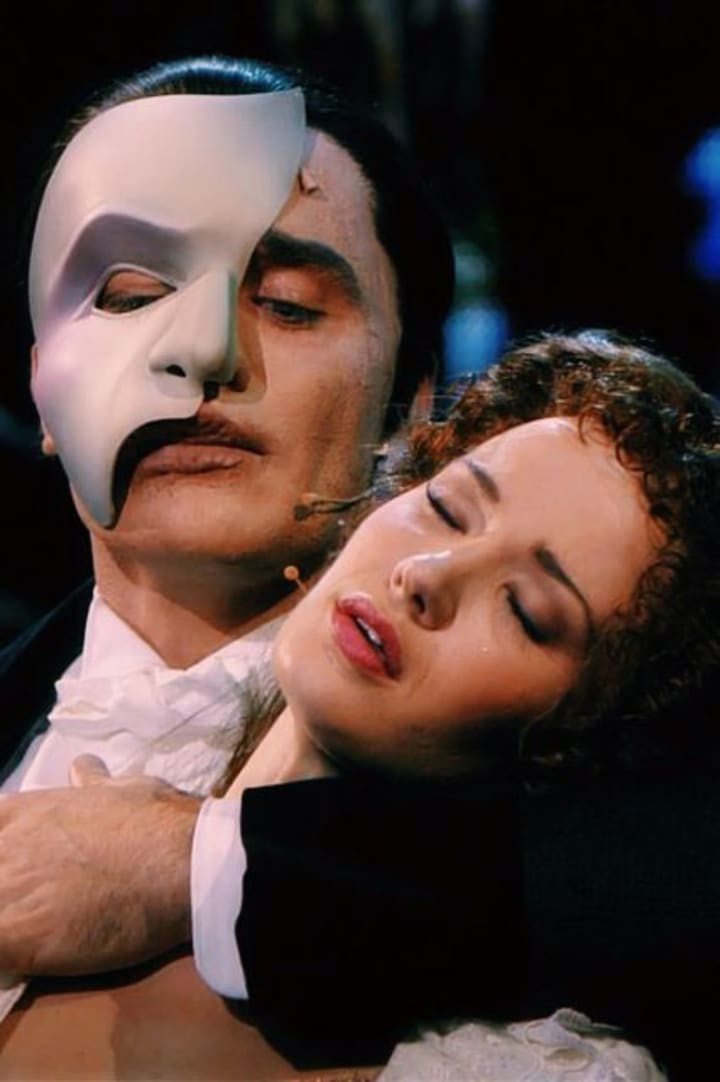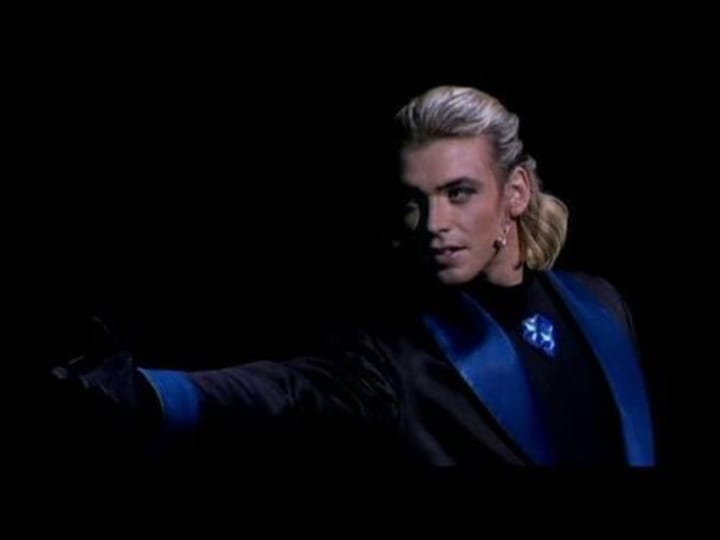Dancing with the Bad Boys
What's up with this obsession with the guys who can do only wrong?

I have a thing for the bad boys—at least when they're safely within the realm of fictional content. It's been a problem for a while, but I think it's only getting worse with age since I'm still finding myself caught up in the stories that feature tortured men who feel a bit too deeply and who make all the wrong choices in pursuit of their goals. (I'll be counting Kylo Ren from the Star Wars sequel trilogy on that count; thanks, Disney!)
My fascination began at an early age with a dinner theater rendition of Phantom of the Opera, featuring the disfigured Erik who will stop at nothing to have his music performed by his angel of music—and he'll do anything to keep her his and his alone.
My young heart (I think I was eight years old) pattered in my chest as I watched Erik cast longing looks Christine's way despite the fact that she was beautiful, he was not, and she already loved another (the aristocratic Raoul—who I still despise to this day). Looking back, I don't know if I was moved because I felt the same—unable to be loved in the shell I found myself in—but something resonated right then and there.
And I've been on a downward spiral with my love for the "emo bad boy" (yes, I'm being facetious) ever since.

Whether you're reading the original novel by Gaston Leroux or watching Andrew Lloyd Webber's musical take, Erik has a lot of troubling tendencies. He's not the boyfriend you'd bring home to Mother and Father, I guess you could say. He is tempting because he is of the shadows—his abode is below an opera house, for goodness sake—and he likely couldn't walk the streets of Paris as he is, black cloak swishing behind him with every movement.
What makes him so tragic yet alluring is how he devotes himself to music—and his muse, Christine Daaé. In the (admittedly a little cringe-worthy) movie adaptation from 2004, Erik even has constructed a replica of Christina in a wedding dress, the sight of which makes her faint (and who wouldn't? That's creepy on so many levels).

I was lucky enough to see the full-length musical on tour in Chicago in 2019. Erik is still portrayed in far more gray tones than a black-and-white morality. The power of his voice alone, no matter the actor portraying him, makes renditions of "Phantom of the Opera" and "Music of the Night" darkly beautiful and quietly evocative.
But would any self-respecting woman ever want to play wife to Erik in his lonely chambers below the opera house? I think not. But the fantasy is what makes him appealing: how would you feel if someone loved you so much that he would go to every end to offer you his love? No matter what society would tell him was wrong? It's a troubling pathway for sure—and we wonder why real young women fall for the abusive and manipulative men who show up in their lives—yet I feel that, in fictional media, we are able to push that boundary to explore just how these kinds of trappings would work in a removed scenario.
(And, no, Mr. Webber, we did not need True Love Never Dies to make the Erik/Christine relationship canon. That wasn't the point at all. Go back and read the source material by Leroux, for God's sake.)
At the end of the original novel, what saves Erik is that he loved Christine so much that he let her go, even though in doing so he broke his own heart. While his actions throughout the story can't be excused, it says something that it was an act of unconditional love that might have made all the difference in his life.

To go down another winding road of analysis, let's talk Jim Henson's Labyrinth, a film that remains iconic despite its flop at the box office in 1986. If you've not seen the film, I don't exactly recommend it other than a few scenes—all of which feature David Bowie rocking it as the Goblin King Jareth.
The heroine Sarah has a story which is coming-of-age at its barest bones. Rather than deal with her crying baby brother, she wishes he would be taken away by goblins—and, what do you know, he is snatched away. Then what follows is her quest to find him and return him back to safety at home.
The film itself can be quite hokey—but there's a splendid ballroom scene where Sarah dances with the Goblin King and sparks begin to fly. She is tempted in a way she has never been before. She's only sixteen years old, but the way Jareth looks at her—she's spellbound, caught in his gaze, ready to be his prisoner forever.

She breaks away from the enchantment—but was it really just an enchantment?—but something has profoundly changed within her. No longer is she just a girl caught up in another world's trappings; she is a young woman who has to make a choice whether to stay in the fantasy or fight for her right to live a full life in the human world.
Even if she could be the Goblin Queen, could she ever have really lived with herself? Could she have given up everything just to be the Goblin King's consort? We never find out because Sarah breaks away from all manner of magic and seduction to keep herself grounded in the reality she wants first and foremost.
Temptation is a big thing in the bad boy realm. You never know when you might succumb to the charms directed at you—even if that means it's a lifetime struggle with your better angel to keep hold of the life you want, not the one dictated to you from the darkness trailing after you.

Enter in Der Tod, the pseudo-antagonist in the Vienna-imported musical Elisabeth (which has seen productions in Japan, South Korea, and even China with no plans to reach English-speaking audiences any time soon). The main character is Empress Elisabeth of Austria who, as the opening number cites, danced with Death like no one else. What follows is Elisabeth's life as she struggles to assert her independence, even against a personification of Death (Der Tod) looming over her at every step.
Though you might wonder, "Why would she be infatuated with something (or, in this case, someone) whose only goal is to see her dead?" The real life Elisabeth is said to have had an unhealthy obsession with keeping her youth while also pondering death in multi-faceted ways that, if she were anyone else at that time in history, might have landed her in an asylum.
In the musical, however, Elisabeth's fascination begins at an early age when she has a near-death experience where Der Tod carries her to safety, sparing her life in that instant, and from there forward the two have a back-and-forth pull throughout the course of her life.
Der Tod, for his part, is characterized a bit differently in each iteration of the musical. He can be androgynous and cold (original Vienna production), seductive like a Gothic romantic figure (Japan and South Korea productions), or unpredictable and wild like a storm (Vienna revival). His show-stopping scene always comes with his solo, "The Last Dance," where he tries to convince Elisabeth that his will is the one that will decide where her cards lay. She is nothing in the face of the force he is. And, even if she is wed to another, the one she'll always have in her thoughts is he.
As the musical goes on, you come to the hard realization that Death is inevitability. Der Tod does not need to use tempting words and admonitions with Elisabeth at every turn; she will eventually come to him, no matter her wishes, as we all will.
But there is something else there too: Der Tod likes the chase, to be sure, but at the end—when Elisabeth embraces him fully for the first time—there is a quiet look of astonishment on his face (if you're watching the first Vienna revival, which I highly recommend). It seems he too is a captive of this woman he has followed in the shadows for the sixty years of her life.
And there, I think, is the core allure of most bad boys: with only a look, they are undone by the women they hold torches for. While they'll never be the ones you openly confess love to—loving them feels like a secret you need to keep—they too are held captive by feelings they cannot control (nor do they seem to want to control them).
In reality, that would probably be a nightmare—but in the realm of fiction? It's a romance of the ages.

If you enjoyed this article, please consider leaving a heart or even a tip. You can find more of my ramblings over on my profile page. Thank you for reading, and I hope you know better than to fall for the bad boys like I have.
About the Creator
Jillian Spiridon
just another writer with too many cats
twitter: @jillianspiridon






Comments
There are no comments for this story
Be the first to respond and start the conversation.